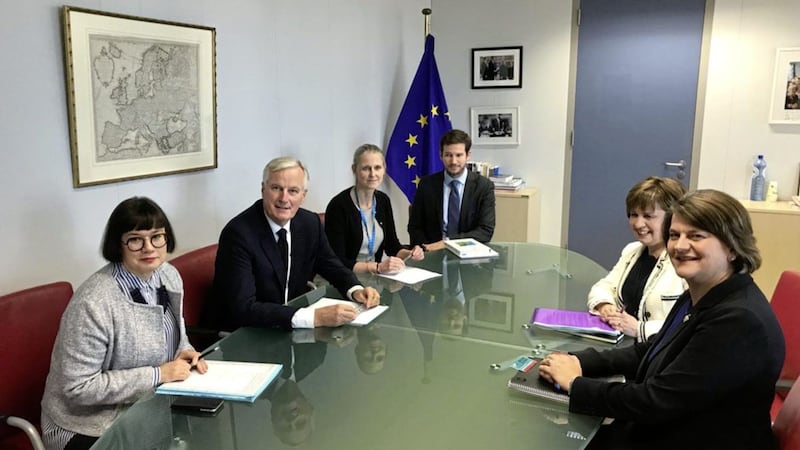Before Arlene Foster posted a photo of her meeting with the European Union’s chief Brexit negotiator Michel Barnier last week, she might have wanted to crop out an EU official at the back of the shot.
The bearded young man, who was glancing away from the camera, had a look which seemed to encapsulate all our feelings when it comes to Brexit - extreme confusion mixed with a strong desire to pretend he’d never heard any mentions of Chequers plans, backstops or hard borders.
Unfortunately Brexit trench warfare is only going to intensify over the coming weeks.
At times of uncertainty, the DUP’s tactic is often to dig themselves into position, periodically emerging to try and grab a few metres of extra ground, no matter the cost.
Mrs Foster insisted that any Brexit deal which would see Northern Ireland have a different status to Britain would cross her party’s ‘red line’. Unhelpfully, she described the line as “blood red”.
There are certain words which are best avoided in political speeches and blood is one of them.
The word has unfortunate links with both Enoch Powell’s poisonous 1968 ‘Rivers of Blood’ speech, in which he strongly criticised immigration from Commonwealth countries to the UK, and Ulster Volunteer gun-runner Major Frederick Crawford, who claimed he had signed the Ulster Covenant in his own blood.
And then there’s the famous blood red hand of Ulster - an ancient symbol linked to the O’Neill clan who battled English rule - but which, more recently, has been associated with loyalist paramilitaries.
Mrs Foster may not have had these associations in mind when she made her comment. Certainly she seemed irate that her party hadn’t yet seen the text of a ‘hybrid’ backstop proposal, aimed at avoiding a hard border in the event of a no deal Brexit, which the British government had been due to unveil “soon”.
But as a lawyer and an experienced politician she would have been aware of how certain words have huge weight and power. There was more than an echo of Mr Powell when she claimed “these are significant days for Northern Ireland and the United Kingdom as we know it".
The DUP’s decision to abstain from a vote on last Wednesday’s agriculture bill in the Commons was a clear warning to Theresa May that the party could collapse its ‘confidence and supply’ deal with the Tories if its Brexit demands are not met.
Tory vice chair Helen Grant claimed the DUP was “bluffing” when it suggested it could refuse to back the Government’s budget. Clearly she has grossly underestimated the unionist party’s love of intransigence.
Talk of red lines will play well to the DUP’s core supporters. But the truth is we are already treated differently from Britain, simply due to our geographical status.
Animals imported from Britain are already checked by inspectors to avoid the spread of disease throughout Ireland.
Of course the DUP has previously pushed for special status for the north when it suited them.
During the BSE crisis in the mid 1990s, MPs, including the DUP’s William McCrea lobbied for Northern Ireland beef to be given special status in Europe “as a priority”.
Figures at the time showed there had been far fewer incidents of ‘mad cow disease’ in herds in the north, compared to Britain. And northern farmers were keen to make a distinction between their beef and British-raised herds.
In the end, an export ban was introduced on Northern Ireland and British beef in 1996 and remained in place for 10 years.
The much-discussed ‘confidence and supply’ deal with the Tories is another case of special status.
It was supposed to bring £1 billion to the north. Yet it also drew the anger of Scottish and Welsh MPs who questioned why the north should get extra money ahead of their constituents. Why should one part of the UK be treated differently from the rest, they said. Aren’t we all one country?
So far, we've only been given a fraction of the £1 billion. And if the DUP's deal with the Tories collapses we're unlikely to ever see the rest.
The truth about the disastrous Brexit negotiations is that no one knows exactly what’s going on or what will happen once we leave the EU in March. Everything up to this point is conjecture.
What we can expect is several painful years as businesses, services and the health service struggle to cope with the reality of leaving a union which has hugely benefited the north.
Inflammatory talk of "blood red" lines won't help.








